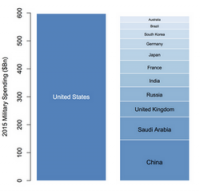-
Navy tests new mine-detection drone
The new Mine Warfare Rapid Assessment Capability (MIW RAC) system is a portable, remote-controlled system that can detect buried or underwater mines during amphibious beach landings. It’s designed to help explosive ordnance disposal teams quickly find mines and dangerous metal obstacles within coastal surf zones and very-shallow-water zones. MIW RAC consists of a one-pound quadcopter outfitted with an ultra-sensitive magnetometer sensor system to detect mines and provide real-time search data to a handheld Android device.
-
-
Russia successfully tests hypersonic missile which renders Western defenses obsolete
Russia says it has successfully tested a hypersonic missile, a year ahead of schedule. The missile is faster than any other missile currently deployed by the world’s armies, capable of reaching a speed of up to 4,600 mph, which is nearly six times the speed of sound— covering a distance of 155 miles in just 2.5 minutes. At that speed, no current missile defense would be capable of intercepting and destroying the missile as it travels toward its target. “We’re in a period of possible military parity again,” says a British defense analyst, adding that the new hypersonic missile will push Russia ahead.
-
-
Detecting and preventing the use of chemical weapons
Like detectives looking for clues, researchers at the Department of Energy’s Pacific Northwest National Laboratory have been working for nearly a decade on ways to identify the “fingerprints” of potential chemical threats. The ability to identify a particular agent and attribute its source is key to responding to and even preventing these threats.
-
-
New fabric coating could neutralize chemical weapons, save lives
Chemical weapons are nightmarish. In a millisecond, they can kill hundreds, if not thousands. But, in a new study, scientists report that they have developed a way to adhere a lightweight coating onto fabrics that is capable of neutralizing a subclass of these toxins — those that are delivered through the skin. The life-saving technique could eventually be used to protect soldiers and emergency responders.
-
-
Cybersecurity on the fly
When we think of cybersecurity, we think of applying protection measures to our desktop computers such as installing antivirus programs and using passcodes and pin numbers. Just like our computers, aircraft systems are vulnerable and are not exempt from a cyber-attack. If hacked, some examples of possible cyber effects on aircraft systems can be anything from breakdowns in communication and navigation systems to the more critical systems such as collision avoidance and life support systems.
-
-
Diplomat: Hezbollah is now more powerful than most NATO members
The Iran-backed terrorist group Hezbollah is “now more militarily powerful than most North Atlantic Treaty Organization members,” a former Israeli ambassador to the United Nations says. In violation of UN Resolution 1701, which was adopted to end the 2006 Lebanon War, Hezbollah has acquired an estimated 150,000 missiles — more than the combined arsenals of 27 NATO nations — with a range capable of striking “anywhere in Israel” and the ability to “launch 1,500 of them a day,” Ron Prosor wrote.
-
-
Service Academies Swarm Challenge: Expanding the capabilities UAV swarms

More than forty Cadets and Midshipmen from the U.S. Military Academy, the U.S. Naval Academy, and the U.S. Air Force Academy helped expand the capabilities of swarms of highly autonomous unmanned aerial vehicles (UAVs) last month in the Service Academies Swarm Challenge. In the skies over Camp Roberts, an Army National Guard post north of Paso Robles, Calif., each academy demonstrated the innovative offensive and defensive tactics they had developed over the school year. The three-day experiment concluded with an exciting aerial battle in which the Naval Academy took home the win, a trophy, and bragging rights over its rival academies.
-
-
U.S., rejecting Turkish opposition, to arm Kurdish militia ahead of Raqqa battle
The Trump administration has decided to arm Syria’s Kurdish fighters because it was “necessary” for recapturing the ISIS stronghold of Raqqa. The decision was made in the face of fierce opposition from Turkey, a NATO ally which regards the Syrian Kurds as terrorists. Turkey has been worried that a better-armed Kurdish militia — known as the Kurdish Peoples’ Protection Units (YPG) – would be in a stronger position to aid the PKK, a Turkish Kurdish group agitating for greater Kurdish autonomy in eastern Turkey. The YPG leads the Syrian Democratic Forces, or SDF, a multi-ethnic armed militia. Turkey was willing to agree to the arming of the non-Kurdish elements of the SDF, but the Pentagon concluded that without the YPG, the SDF would not be an effective fighting force.
-
-
Pentagon looks at new evidence of military cooperation between Iran and North Korea
The Pentagon says that a submarine used in the failed underwater launch of a cruise missile last week by Iran, draws attention to Iran’s military cooperation with North Korea. When Iran used a “midget” submarine for the underwater launch of a Jask–2 cruise missile this week, U.S. Defense Department officials said that it was based on the North Korean Yono design. This was seen as further evidence that the two nations are sharing military technology.
-
-
New evidence shows pattern of Assad regime’s use of nerve agents
New evidence supports the conclusion that Syrian government forces have used nerve agents on at least four occasions in recent months: on 4 April 2017, in a chemical attack on Khan Sheikhoun that killed at least ninety-two people, and on three other occasions in December 2016 and March 2017, Human Rights Watch said in a report released yesterday. These attacks are part of a broader pattern of Syrian government forces’ use of chemical weapons. The attacks are widespread and systematic, and in some cases have been directed against the civilian population. As part of the evidence showing these attacks have become widespread and systematic, the detailed 48-page report identifies the three different systems being used by the Assad regime to deliver chemical weapons.
-
-
Service Academies Swarm Challenge: Controlling drone swarms

UAVs and other robots have become increasingly affordable, capable, and available to both the U.S. military and adversaries alike. Enabling UAVs and similar assets to perform useful tasks under human supervision — that is, carrying out swarm tactics in concert with human teammates — holds tremendous promise to extend the advantages U.S. soldiers have in field operations. A persistent challenge in achieving this capability, however, has been scalability: enabling one operator to oversee multiple robotic platforms and have them perform highly autonomous behaviors without direct teleoperation. To help make effective swarm tactics a reality, DARPA created the Service Academies Swarm Challenge, a collaboration between the Agency and the three U.S. military Service academies.
-
-
Explosions rock Damascus Airport following cargo flights from Iran
Explosions rocked the area near Damascus International Airport early Thursday morning following the arrival of four cargo planes from Iran. Israeli leaders have said that Hezbollah receiving game-changing weapons, such as advanced missiles or chemical weapons, represents a “red line” that Israel will not accept.
-
-
World military spending: Increases in the U.S., Europe, decreases in oil-exporting countries

Total world military expenditure rose to $1686 billion in 2016, an increase of 0.4 percent in real terms from 2015, according to new figures from the Stockholm International Peace Research Institute (SIPRI). Military spending in North America saw its first annual increase since 2010, while spending in Western Europe grew for the second consecutive year.
-
-
France: We have proof Assad ordered chemical attack on Khan Sheikhun

Jean-Marc Ayrault, France’s foreign minister, said Wednesday that France’s intelligence services have evidence that the Syrian government carried out the chemical weapons attack on a Sunni village earlier this month. The Syrian military’s attack on Khan Sheikhun killed eighty-six. British and Turkish scientists, examining injured victims and performing autopsies on those killed, found evidence of both sarin - a nerve gas - and chlorine.
-
-
Syrian defector: Assad still has hundreds of tons of chemical weapons stockpiled
Syrian President Bashar al-Assad circumvented a 2013 deal to dismantle his chemical weapons stockpile by failing to declare the full extent of his arsenal, Syria’s former chemical weapons research chief. Brigadier-General Zaher al-Sakat, who served as the head of chemical warfare in a top Syrian military unit before defecting in 2013, said that Assad had not declared large amounts of sarin and its precursor chemicals.
-
More headlines
The long view
Factories First: Winning the Drone War Before It Starts
Wars are won by factories before they are won on the battlefield,Martin C. Feldmann writes, noting that the United States lacks the manufacturing depth for the coming drone age. Rectifying this situation “will take far more than procurement tweaks,” Feldmann writes. “It demands a national-level, wartime-scale industrial mobilization.”
